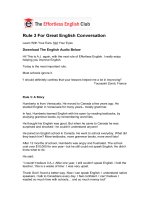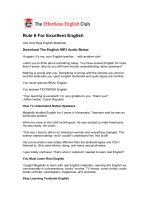041 supreme rule strong forms
Bạn đang xem bản rút gọn của tài liệu. Xem và tải ngay bản đầy đủ của tài liệu tại đây (260.07 KB, 1 trang )
Prof. Francisco Zabala - 2014
SUPREME RULE: Reasons for the use of strong forms
PROMINENCE:
Any word can be
highlighted in the
utterance by
stressing it.
1. CITATION:
• We’ll discuss
di
the weak forms of ‘THE’. .vhk
cH!rjUr
C?
!vh9jeN9ly
?u
!Ch9.
.vhk
cH!rjUr
C?
!vh9jeN9ly
?u
!
• Let’s analyse
an
the uses of ‘CAN’. .!kdsr
!zm?k`Hy
C?
!it9rHy
?u
!jzm.
2. EMPHASIS:
• Phonetics
ics is THE subject. .e?!mdsHjr
Hy
!Ch9
!rUacYHjs.
• We MUST meet soon. .vh
!lUrs
!lh9s
!rt9m.
• Please do transcribe REGularly. .!okh9y
!ct9
sqzm!rjq`Ha
!qdfi?k?kh.
i?k?kh.
3. STYLISTIC
These are
optional. The weak
form is the norm,
but the strong
form is possible,
too.
a. First word in the chunk
• As I SAID | we should FIRE him. .?y
`H
!rdc
{
vh
R?c
!
{
vh
R?c
!e`H?q
Hl.
As I SAID | we should FIRE him. .!zy
`H
!rdc
rdc
{
vh
R?c
!e`H?q
Hl.
• Are they HERE? .?
CdH
!gH?.
Are they HERE? .!@9
CdH
!gH?.
b. “Buttressing” or “Rhythmic Strengthening”
Preposition + pronoun
• I asked QUEStions of her. .`H
!@9rs
!jvdrsRmy
?u
?.
sRmy
?u
?.
I asked QUEStions of her. .`H
!@9rs
!jvdrsRmy
!Pu
?.
sRmy
!Pu
?.
Pronoun + preposition + pronoun
• We’ve COOKED them for her. .vhu
!jTjs
C??l
e?q
?.
We’ve COOKED them for her. .vhu
!jTjs
C??l
eN9q
?.
4. CONTRAST: “X not Y” – elements of the same set
Explicit:
• He was talking to US, not to THEM. .gh
v?r
!sN9jHM
st
!Ur
{
!mPs
s?
!
{
!mPs
s?
!Cdl.
Implicit:
• I want to marry YOU (not your mother). .`H
!vPms
s?
!lzqh
!it9.
Short questioon
ns and answers (contrast on polarity):
• A: WAS it? B: Yes, it WAS. .!vPy
Hs
{{
!idr
Hs
!vPy.
5. HEAVY SEMANTIC WEIGHT:
Negative contractions:
• You weren’t
were inVITed. .it
!v29ms
Hm!u`HsHc.
Main verbs “do” & “have”:
• We’ll do the HOMEwork. .vhk
!ct9
C?
!g?Tlv29j.
• We could have some COFfee. .vh
j?c
!gzu
r?l
!jPeh.
Causative “have”:
• She’s had her HOUSE painted. .Rhy
!gzc
g?
!g`Tr
!odHmsHc.
Obligation “have to”:
• He has to attend
at
CLASses. .gh
!gzy
st
?!sdmc
!jk@9rHy.
SYNTACTIC GAP:
STRANDING1
Strong, regardless
of whether they
are stressed or not.
1. AUXILIARIES & PREPOSITIONS: syntactic movement
I wonder where they ARE (, Dan). .`H
!vUmc?
!vd?
CdH
!@9
'!czm(.
What I’m THINKing
THINK of is a SECret. .vPs
`Hl
!SHMjHM
Pu
{
Hy
?
!rh9jq?s.
What are you LOOKing at(, Pam)?
.!vPs
?
it
!kTjHM
zs
'!ozl(.
2. AUXILIARIES: ellipsis
A: Who can get this SATurday off?
B: YOU can, if you finish your rePORT. .!it9
jzm{
He
it
!eHmHR
iN9
qH!oN9s.
Notice:
Syllables in bold are stressed.
Each NUCLEUS is underlined and in bold capitals in the orthographic version. They are in bold in the transcriptions, too.
1.
Stranding “A term used in some grammars to refer to an element which is left unattached after it has been moved out of a
construction,, or after the rest of the construction has been moved.” Crystal, D. (2008). A dictionary of linguistics and phonetics.
Blackwell: Oxford.
2.
Buttressing means “strengthening.” Speakers may strengthen the preposition so as not to create contrast by stressing the
pronoun.









